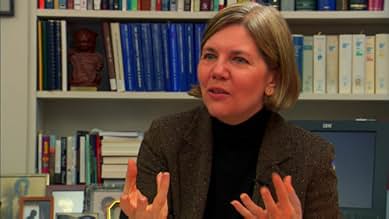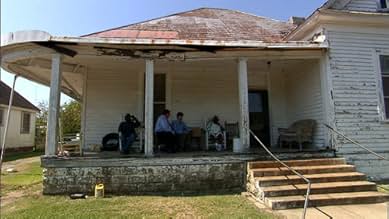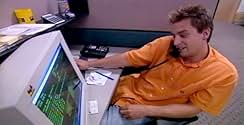Ajouter une intrigue dans votre langueWhen Hurricane Katrina ravaged America's Gulf Coast, it laid bare an uncomfortable reality-America is not only far from the world's wealthiest nation; it is crumbling beneath a staggering bu... Tout lireWhen Hurricane Katrina ravaged America's Gulf Coast, it laid bare an uncomfortable reality-America is not only far from the world's wealthiest nation; it is crumbling beneath a staggering burden of individual and government debt. Maxed Out takes us on a journey deep inside the Am... Tout lireWhen Hurricane Katrina ravaged America's Gulf Coast, it laid bare an uncomfortable reality-America is not only far from the world's wealthiest nation; it is crumbling beneath a staggering burden of individual and government debt. Maxed Out takes us on a journey deep inside the American debt-style, where everything seems okay as long as the minimum monthly payment arri... Tout lire
- Réalisation
- Scénario
- Casting principal
Avis à la une
This film shows that the credit companies actually want those who are just getting by to use their cards because they make a killing on late fees and higher interest. They don't want to prevent bankruptcies, because they can get you hooked again as soon as you file. The predatory practices of the mortgage lenders is also displayed.
What was not a surprise was the revelation that a member of the current administration was an executive in a credit card company that was fined huge amounts for stealing from customers, and the fact that the largest campaign contributor in the 2004 election was the banking institution that coincidentally co-authored a bill that made it harder for middle-class Americans to file for bankruptcy.
If you use credit, and we all do, then you really need to see this.
James D. Scurlock, the writer and director of the film, brings us one heartbreaking story after another about ordinary average citizens who have fallen victim to this consumer-credit nightmare. Some are struggling working-class folk who were scammed by debt-consolidation lenders into believing that they would be paying lower interest rates and payments on their loans, only to discover that their new rates and payments were, in reality, astronomically higher. Others are 18 year-old college students, who, it turns out, are prime targets for credit card companies who see these "bad risks" as gold stars in their corporate profit ledgers. Lending institutions also go after people who have previously filed for bankruptcy, knowing that such individuals are not only spending-prone by nature but legally unable to file for bankruptcy a second time. Scurlock also interviews debt-collectors who seem all but indifferent to the plight of those they are going after, as well as more humanistic economists who understand completely the depth of the problem.
Perhaps the most damning criticism is leveled at politicians like George W. Bush and the members of Congress who passed the ironically named Bankruptcy Abuse Prevention and Consumer Protection Act of 2005, making it much harder for the average American to escape his consumer debt burden and much easier for irresponsible creditors to hound their debtors sometimes literally to death, a point Scurlock brings home when he interviews people whose loved ones have committed suicide as a result of their financial and debt-related woes. Yet, ironically, the film also shows the flippant attitude government officials seem to adopt regarding the nation's own debt situation as trillions of dollars of red ink spill unimpeded across the nation's treasury.
In terms of style, "Maxed Out" lacks the pizazz and showmanship of a Michael Moore expose, but Scurlock's single-minded passion still shines through loud and clear. This is a fairly straightforward talking-heads documentary that cuts to the heart of the problem with compassion and precision. The director does provide some much needed levity, though, by showing us snippets of a very funny standup comedy routine on the subject by Louis C. K., as well as excerpts from a typically cheesy 1960 instructional short entitled "The Wise Use of Credit" (the DVD contains the full ten-minute version of the film in the "Extra Features" section).
"Maxed Out" is another in a long line of documentaries seemingly designed to make one feel insignificant and powerless in the face of hugely impersonal corporate forces. Yet, if knowledge itself is power, then movies like "Sicko," "Enron: The Smartest Guys in the Room," "Maxed Out" etc. may, in their own small way, help lead to much-needed reform and change in the way the government and Big Business deal with the least of us in society. Let us hope that is the case.
This movie opened my eyes to how many of these credit giants prey on the uninformed and manage to make money through bankruptcies.
Someone charges $1000, makes a payment then goes delinquent. The late penalties cause that to become $3000, then after 180 days the bank writes that debt off and sells it at 50% to a debt collector for $1500. The bank still collects their principal, plus whatever payments the original person made, plus $500, plus takes a write off. It seems like a no brainer to hand money out like paper.
When a predator offers candy to a child, do we blame the child for taking the sweet bait? No, because the child didn't know better. So are these people at fault?
to have "things" no matter what the cost is quite sad. I cried with the moms in the film talking about their kids, and what credit card debit as done to new college students.
It was scary and informative... Now excuse me while I go check my credit rating!
As one of the characters early on in the film, I was aware of a lot of the dirty tricks and tactics used by creditors, bill collectors, 'professional debt collectors' and the like. I truly thought I knew about the level of greed this film would expose in the credit industry. I was a debt collector for nearly a decade but left the industry because of the many 'slime balls' indigenous to the profession. It takes a certain kind of person to remain in this industry for the long haul.
What I did not know, was the depths at which some creditors would be willing to sink. Even I was appalled at the actions of some of the biggest names in the lending business, and I thought I had seen every dirty trick in the book. Without going into detail as to how Maxed Out reveals the atrocities committed by the credit industry as a whole, I can only say that you will likely leave the theater totally amazed yet possibly disgusted in the aftermath of Maxed Out's revelations. You'll likely be very surprised to see who has their hands deeply submerged in the proverbial cookie jar.
Although the inevitable comparisons between Maxed Out and Super Size Me will be drawn, one must realize that not everybody eats at McDonald's but everyone has debt. Even if it's just your share of the national debt. Everyone is affected by debt.
A lot has changed since my bankruptcy ten years ago. Thanks to a new change in the bankruptcy laws it's virtually impossible to obtain the level of bankruptcy protection today that I relied on in 1996. The public needs to know what's happening before these modern day loan sharks end up trying to take over the world and turning us all into eternal debt slaves. James Scurlock should be applauded for doing this film. This story would have been very easy 'not to do.'
The most unexpected thing about Maxed Out is its breathtaking resolution on the big screen. A lot of the footage shot for Maxed Out looks spectacular thanks to the genius of Jon Aaron Aaseng. It's almost inconceivable that a documentary about America's credit card debt can be this entertaining, this provocative and this easy to watch all at the same time. See it.
Le saviez-vous
- Citations
Elizabeth Warren: Have you seen the new card that they're talking about putting out now-where you can get a credit card against your pension account, so that, when you go and charge it, it automatically, if you don't pay, will be withdrawn from the money you've put aside for your retirement? This is one more way that we're trying to string together with chewing gum and bailing wire to keep the American family looking like it's afloat long after it is really sunk with debt.
- ConnexionsEdited from Wise Use of Credit (1960)
- Bandes originalesHail to the Chief
Music by James Sanderson
Performed by The United States Airforce Concert Band
Published by the Department of Airforce
Meilleurs choix
Détails
Box-office
- Montant brut aux États-Unis et au Canada
- 58 829 $US
- Week-end de sortie aux États-Unis et au Canada
- 20 024 $US
- 11 mars 2007
- Montant brut mondial
- 58 829 $US
- Durée1 heure 30 minutes
- Couleur
- Mixage
Contribuer à cette page










